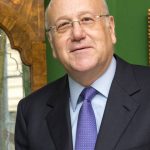Politics
Lebanon Politics
This page explores Lebanon’s political structure incorporating real-time RSS feed news and videos. By harnessing the power of RSS feeds, visitors can stay informed about the latest developments in Lebanon’s politics as they happen. The dynamic nature of these feeds ensures that users receive up-to-the-minute updates on political events, policy changes, and significant milestones, enabling them to stay abreast of the ever-evolving political scene.

Najib Mikati
Prime Minister of Lebanon
Incumbent
Assumed office
10 September 2021
Image credit
Lebanon operates as a parliamentary republic, with a political structure that reflects a delicate balance between various religious and ethnic groups. The country’s political system is characterized by a power-sharing arrangement known as confessionalism, which aims to distribute key positions among the different religious communities.
The executive power in Lebanon is held by the President, who is elected by the Parliament and represents the country at the national and international levels. The President is a Maronite Christian, as per the confessional system, which allocates the presidency to this religious group. The President appoints the Prime Minister, who is typically a Sunni Muslim, based on consultations with parliamentary blocs. The Prime Minister leads the government and is responsible for the day-to-day administration of the country.
The legislative branch in Lebanon is the Parliament, which consists of 128 seats. The seats are distributed among different religious groups based on a complex formula. Christians and Muslims are proportionally represented, and the Speaker of the Parliament is a Shia Muslim. The Parliament enacts laws, approves the national budget, and exercises oversight over the executive branch.
Political parties in Lebanon are often aligned along religious or sectarian lines and play a significant role in the country’s political landscape. However, Lebanon’s political system has faced challenges, including political polarization, corruption, and sectarian tensions, which have resulted in periods of political instability and governance crises.
In conclusion, Lebanon’s political structure is based on a parliamentary republic with a power-sharing arrangement among religious communities. The President represents the country, the Prime Minister heads the government, and the Parliament enacts laws and provides oversight. However, the confessional system and various internal challenges continue to impact Lebanon’s political landscape and stability.
Unless other sources are listed, original content is provided by ChatGPT. ChatGPT may produce inaccurate information about people, places, or facts. #Lebanon #LebanonPolitics #LebanonNews #LebanonNewsToday #LebanonRSSFeed #BlahFace



